|
|
|
Sort Order |
|
|
|
Items / Page
|
|
|
|
|
|
|
| Srl | Item |
| 1 |
ID:
097886
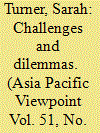

|
|
|
|
|
| Publication |
2010.
|
| Summary/Abstract |
The Chinese, Vietnamese and Lao spaces within the upland Southeast Asian massif, sheltering over 80 million people belonging to geographically dispersed and politically fragmented minority populations, have only recently reopened to overseas academic endeavours. Undertaking social sciences research there among ethnic minority groups is underscored by a specific set of challenges, dilemmas, and negotiations. This special issue brings together Western academics and post-fieldwork doctoral students from the realms of social anthropology and human geography, who have conducted in-depth fieldwork among ethnic minorities in upland southwest China, northern Vietnam, and southern Laos. The articles provide insights into the struggles and constraints they faced in the field, set against an understanding of the historical context of field research in these locales. In this unique context that nowadays interweaves economic liberalisation with centralised and authoritarian political structures, the authors explore how they have negotiated and manoeuvred access to ethnic minority voices in complex cultural configurations. The ethical challenges raised and methodological reflections offered will be insightful for others conducting fieldwork in the socialist margins of the Southeast Asian massif and beyond. This specific context is introduced here, followed by a critique of the literature on the core themes that contributors raise.
|
|
|
|
|
|
|
|
|
|
|
|
|
|
|
|
| 2 |
ID:
097891
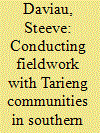

|
|
|
|
|
| Publication |
2010.
|
| Summary/Abstract |
Based on research with ethnic minorities in Laos aimed at understanding how they cope with and negotiate political and economic 'double domination', this article examines the experiences of prolonged fieldwork in a remote Tarieng area in the Annam Range, southern Laos. After briefly reviewing Lao ethnographical policy and practice regarding ethnic minorities, I introduce the Tarieng people. I detail how I initially gained access to these local communities via long-term engagement with a range of development project initiatives. Then, after eight years of conducting such fieldwork in a Tarieng area 'below the radar of the state', I managed to obtain official authorisations to continue research as a graduate student. In this new position, I accessed the field via different negotiations with central, provincial and local official bureaucracies. After detailing this process, back in the field I reveal my strategies to create a discursive space that has allowed me to access dissident Tarieng voices and agency. Finally, I highlight four central elements that have continued to shape my field research: language proficiency, working with research assistants, awareness of political relations and cultural sensitivity, and ethical concerns. These have emerged while the possibilities and constraints of political engagement with the Tarieng people are explored.
|
|
|
|
|
|
|
|
|
|
|
|
|
|
|
|
| 3 |
ID:
097887


|
|
|
|
|
| Publication |
2010.
|
| Summary/Abstract |
The People's Republic of China (PRC) is increasingly open to foreigners undertaking social science fieldwork; yet obstacles remain. Working with ethnic minorities adds further complexities because of the sensitive topics such research may raise. Based on recent fieldwork among the Dong in southeast Guizhou, as the first foreign researcher to ask for and gain official permission to work in the region, this article exposes some of the challenges, both practical and methodological, of conducting research in the PRC. Gaining access to my field site was a long trek through the hierarchic maze of Chinese administration. While reflecting upon this process, I detail my negotiations with local authorities. I then examine how I found reliable statistical data, was able to access the voices of peasants, acted to protect the anonymity of dissident informants, and negotiated working with local research assistants once in the field. These aspects, in turn, highlighted the importance of considering positionality in the field. Although each person's experiences and routes to fieldwork are unique, there are recurrent issues that shape the research process in the PRC. I reflect upon a number of these here, in the hope that this can smooth the way for future researchers.
|
|
|
|
|
|
|
|
|
|
|
|
|
|
|
|
| 4 |
ID:
097893
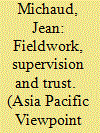

|
|
|
|
|
| Publication |
2010.
|
| Summary/Abstract |
In this research note I reflect upon my different experiences as a researcher with ethnic minorities in Southeast Asia, from my years as a postgraduate student to my current work as a professor. From being a graduate student, to supervising them, I have learned many lessons about graduate fieldwork. Nowadays, I pass these on to supervisees as best I can. I consider it my professional and personal duty to actively warn, inform and prepare young anthropologists about to leave for their masters' and doctoral field research in China, Vietnam and Laos about the field locations to which they are travelling, the political negotiations that they will need to undertake, and the cultural, economic and political differences they will encounter. I also stress that the anthropology that is played out in the field in socialist settings is not necessarily that which we read about in textbooks.
|
|
|
|
|
|
|
|
|
|
|
|
|
|
|
|
| 5 |
ID:
097888
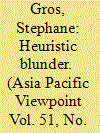

|
|
|
|
|
| Publication |
2010.
|
| Summary/Abstract |
During long-term fieldwork the increasing involvement of the ethnographer in the lives of others raises a series of methodological and ethical issues. These can become even more pronounced when one is working with ethnic minorities in a socialist country. Yet, a seldom acknowledged reality of ethnographic fieldwork experience are the 'little failures' that occur along the way, alongside ethnographic blunders. I argue that these are difficult to avoid and can be part of an important learning process, oftentimes for both researcher and researched. Through the detailed description of a blunder that the author made during his research in southwest China with members of the Drung ethnic minority, this article advocates for the heuristic value of such mishaps, suggesting that one can learn a lot from accidents and unexpected events while undertaking in-depth ethnographic fieldwork. In this case, this helped to shed light on the micropolitics of Drung village life in southwest Yunnan, and the place of a 'minority nationality' in wider Chinese society.
|
|
|
|
|
|
|
|
|
|
|
|
|
|
|
|
| 6 |
ID:
097890


|
|
|
|
|
| Publication |
2010.
|
| Summary/Abstract |
In this article, I detail and evaluate the negotiations I had to broker to conduct ethnographic research on marketplace vendors and trade in the upland borderlands of northern Vietnam. Working with the analogy of the numerous 'lines' I was constrained by, had to manoeuvre around, and at times crossed over, I begin with a discussion of the 'official lines' or state regulations imposed upon my research and how I worked with, or negotiated these limitations. I then reveal the important 'border guards' or gatekeepers, such as local state actors and also field assistants, who enabled or constrained access to informants in numerous different ways. I also highlight the logistical and practical lines that I had to accept and indeed, often draw, to accomplish my study. I conclude with a consideration of how friendships in the field drew me beyond the lines I had originally drawn around my research. These relationships furthered my anxiety over the possibilities for conducting research that ultimately contributes towards social justice in a constrained political setting such as that which presently characterises Vietnam.
|
|
|
|
|
|
|
|
|
|
|
|
|
|
|
|
| 7 |
ID:
097892


|
|
|
|
|
| Publication |
2010.
|
| Summary/Abstract |
Given the increased attention in anthropology and human geography to the positionality and reflexivity of researchers completing fieldwork in foreign countries, it is surprising that we still know relatively little about how research assistants and interpreters are positioned in the field and their own concerns, constraints and coping mechanisms. This article, based on in-depth interviews with local interpreters/research assistants in Vietnam and China, working alongside Western doctoral students researching upland ethnic minority populations, provides space for the assistants' voices. While reflecting upon their own time in the field, we see how the positionalities of these individuals can have rather unexpected consequences. Furthermore, the assistants' analyses of particular events, as well as their take on the best way to proceed in specific circumstances can be at odds with that of their employers, and negotiated coping strategies have to be found. The article concludes with advice from these assistants regarding how future assistants can make the best of their position, and what foreign researchers need to consider in fostering constructive working relationships.
|
|
|
|
|
|
|
|
|
|
|
|
|
|
|
|
| 8 |
ID:
097889
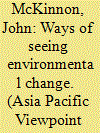

|
|
|
|
|
| Publication |
2010.
|
| Summary/Abstract |
In this article, I reflect on a participatory learning and action (PLA) and participatory geographic information system (PGIS) project undertaken in two adjacent Hani villages in southern Yunnan, China. After a lengthy process to gain research authorisations, Hani villagers worked with a group of visiting researchers (Hani, Han Chinese and New Zealanders) to articulate local visions of land-use change and environmental challenges. PLA exercises produced a diverse range of hand-made and PGIS products over a 10-week period. As villagers became more accustomed to the 'outsider team', methods - both designed and spontaneous - diversified. Afterwards, based on the results and acting on their own initiative, local leaders backed by popular support moved quickly to reassert traditional and ritually prescribed Hani conservation measures. Nevertheless, these endogenously driven solutions were not necessarily universally beneficial. In describing the complexities encountered in implementing a participatory framework and the ambiguities of the outcomes engendered, I argue that privileging local coherence and celebrating such participatory approaches should not be done at the expense of ignoring the intricacies of on-going contradictory behaviours in a rapidly changing arena. Yet, in China, where authorities often remain suspicious of those seeking to undertake long-term fieldwork, especially among ethnic minorities, PLA offers a potential route forward.
|
|
|
|
|
|
|
|
|
|
|
|
|
|
|
|
|
|
|
|
|